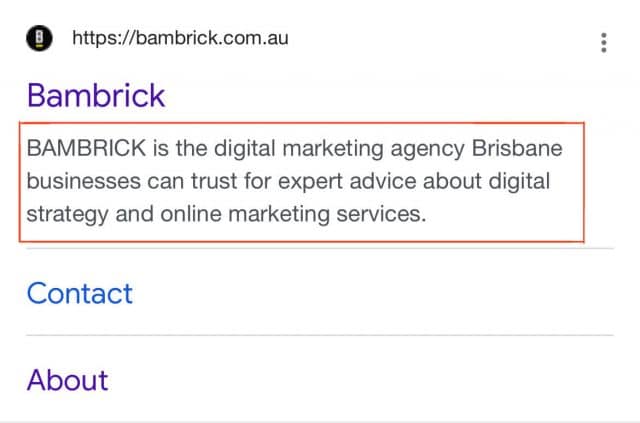What are meta descriptions?
In short, a meta description provides a brief summary of the content on a web page.
When you search for something on google, you know exactly what type of answer you’re seeking. There’s nothing worse than having to wade through hundreds of websites, clicking and perusing over and over again, just to see that they don’t provide the simple answer you’re looking for.
The meta description allows you to check the relevance of a website fast!
Appearing under your meta title in the search results, this HTML element is typically short, snappy, informative, and engaging. It gives a user an idea of what content they should expect if they click on the web page.
Do meta descriptions affect search engine results?
Meta description tags are a snippet of content that appear on the search engine results page (SERP). Other than encourage clicks, what does a meta description do? If it’s written poorly, will it affect search engine results and your website’s ranking? Should you avoid duplicate meta descriptions when writing these tags for your own site?
Good news! According to google, search engines don’t actually use your meta descriptions to decide how you rate. Theoretically, your meta description could be made up of gibberish words and google wouldn’t punish your position. However, before you decide to ignore your meta description, it is still a crucial factor that determines the number of clicks you receive.
Why are meta descriptions important?
Before anyone reads your website, they read your meta name description content. The entire worth your site holds, is decided in that tiny summary on the search results page. If you aren’t immediately answering someone’s query in your meta description, chances are that they won’t click on your site at all.
So while a meta description technically doesn’t affect a search result or your page’s ranking, it does affect how many visitors your site receives.
Like a blurb on the back of a book, if your meta description is enticing, then your site is more likely to be read.
What is the ideal meta description length?
Every meta tag has a maximum number of characters that it needs to follow. For a meta description tag, your maximum should be about 990px. For an optimal meta description, you should aim to be close to this maximum and ensure that your summary is entirely relevant to your site.
How do you write a good meta description?
Have you looked at the existing meta description on your site and decided it’s not quite up to par? Do you want to write meta descriptions that draw more clicks? Here’s a couple tips to make your own meta description better:
- Clearly tell a user what content they’ll receive if they click on your site. If you’re a site about cars, you need to mention that in your description. No one wants to read a meta description that talks about something entirely different to what they get on the site.
- What makes you and your site stand out? Entice a user! Remember that you’re marketing yourself and your site.
- Don’t go over 990px when you write your description. Use a free SERP optimiser to test how long your description is and keep it at an optimal length.
- Use as many characters as you can. Don’t just write two words and call it a day. Fit in as much as you can into your description, in a clear way.
- If you have keyword research, use your keywords! Fit in your top keywords into your meta description wherever possible.
Good luck with all your meta description endeavours!



